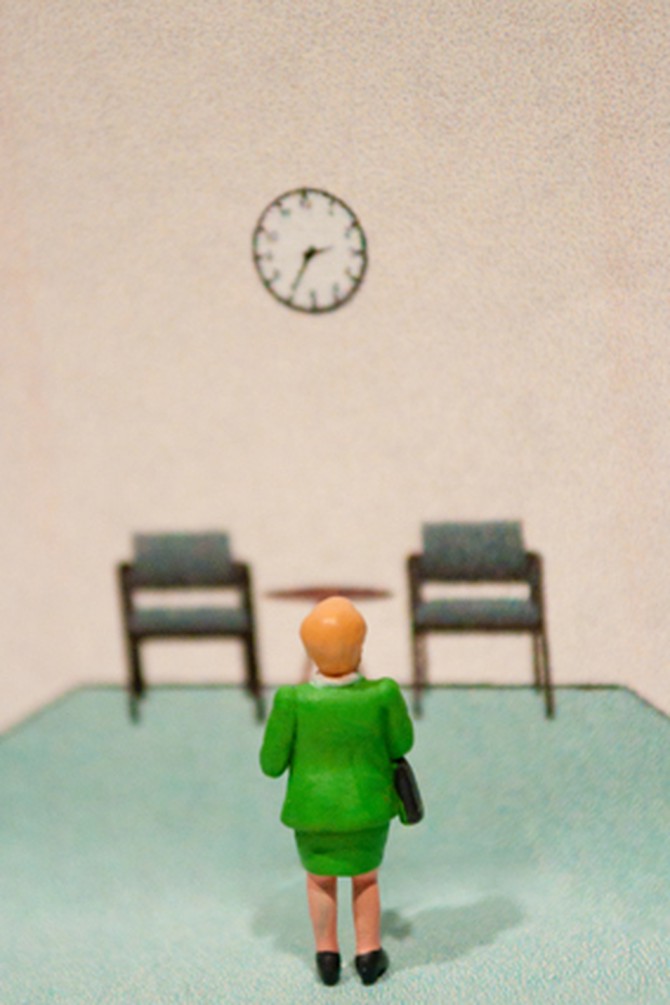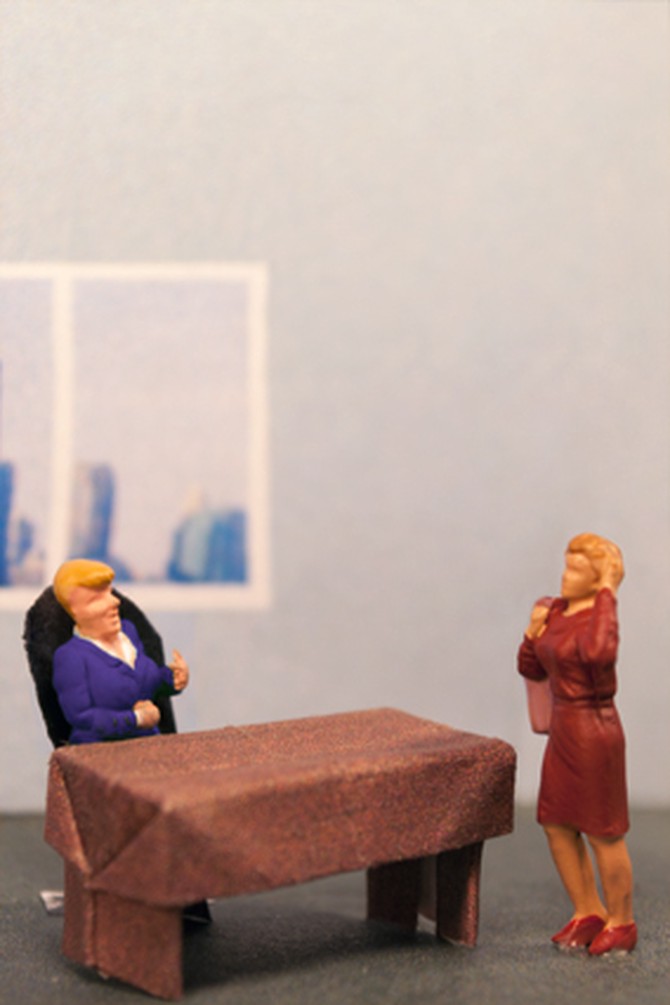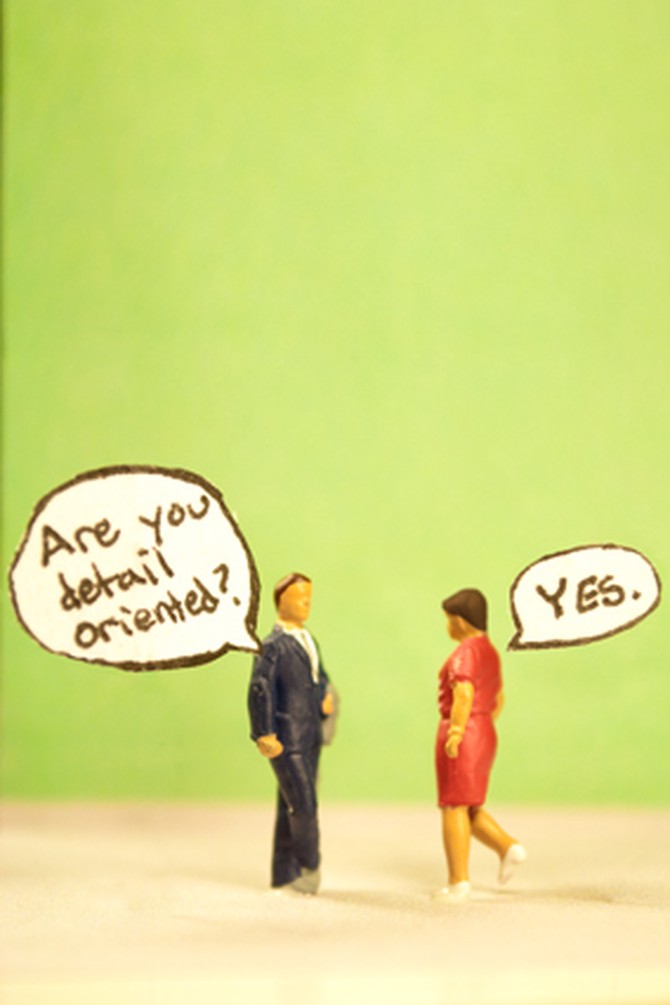6 Things Not to Do in a Job Interview
You've got the handshake down, now you just need to avoid these common slipups people make when applying for a new job.
By Lynn Andriani

Photo: Jade Copple
Show Up for Your 3:00 p.m. Appointment at 2:35 p.m.
What you think you're doing: Demonstrating how eager you are.
Why it doesn't work: Arriving more than five or 10 minutes ahead of time can inconvenience the person who's interviewing you, putting pressure on her to finish whatever she's working on so as not to keep you waiting.
What to do instead: Monster.com career-advice expert Mary Ellen Slayter says it's fine (even advisable) to get to the building where your interview is way before the scheduled time, but find a nearby coffee shop or just sit in your car in the parking lot while you wait. Use the extra time to review what you're going to say—and, if you're anxious, remember that the right amount of nervousness will make you an even more impressive interviewee.

Photo: Jade Copple
Fire Off an Email to Your Current Boss While You're Talking to the Receptionist
What you think you're doing: Trying not to get fired.
Why it doesn't work: You might be so focused on wowing your interviewer (and getting back to your office for a 3 o'clock call) that you've got blinders on and don't even realize you've been rude to the receptionist, a potential future co-worker in the restroom, or the boss's best friend in the lobby.
What to do instead: Slayter says it's a good practice to treat everyone as if he or she has the opportunity to torpedo your chances of getting the job—or to sing your praises to the person who's deciding whether to hire you.

Photo: Jade Copple
Answer the Question, "Are You Detail-Oriented?" with, "Yes."
What you think you're doing: Explaining your skills in a succinct, direct way.
Why it doesn't work: Slayter says claiming you have a trait is not enough; to really convince an interviewer, you must articulate examples.
What to do instead: Look at the job description beforehand and you'll probably see common buzzwords and phrases such as "self-starter," "results-focused" and "analytical." Come up with three real—and totally nonbuzzword-y—examples of how you've demonstrated each skill on that description ahead of time, so you don't have to think on the fly.

Photo: Jade Copple
Forget the One Thing (Outside of the Job) You Love Most
What you think you're doing: Coming across as 100 percent professional.
Why it doesn't work: The all-business approach doesn't give someone who might be spending a lot of time with you in the near future a chance to form an interpersonal impression of you.
What to do instead: The interview primarily evaluates how good you are at the job, but don't be afraid to use the post-interview chitchat to brag about your hidden talent (you can whip up biscuits blindfolded) or passion project (you've been practicing Mandarin because you really want to visit Beijing). Ages-old research shows that we recall things (and people) that stand out more easily than we recall typical things, so give the hiring manager a unique way of remembering you.

Photo: Jade Copple
Send the Wrong Thank-You Note
What you think you're doing: Being polite.
Why it doesn't work: Rosemary Haefner, VP of human resources at CareerBuilder.com, says candidates often agonize over the handwritten versus email thank-you quandary, and then shoot off a generic letter of appreciation. But getting the form right is less important than taking advantage of your last opportunity to connect with the interviewer and show why you're right for the job.
What to do instead: Haefner says a general rule of thumb is to send an email within 24 hours, thanking the interviewer and mentioning specific points that came up in the interview. Some career experts say a handwritten note is a nice touch, but choose your stationery carefully: That glued-on glitter looks a lot less nice when it winds up all over someone's desk.

Photo: Jade Copple
Request Confirmation
What you think you're doing: "Just following up" (and showing off how organized you are in the process).
Why it doesn't work: It's easy to assume the only reason you haven't heard from someone is that the person's a jerk; but, more likely, she's swamped, waiting on budget approval or putting HR paperwork through. Asking for an answer with bullyish language, such as, "Please confirm that you received this," is a great way to ensure you'll push anyone who's on the fence about you in the wrong direction.
What to do instead: After you've sent the thank you note, it's okay to check in once, or even two times; but, after that, move on. Otherwise, says Slayter, "You're in stalking territory."
Next: 6 reasons you are making less than you should
Published 02/07/2014

